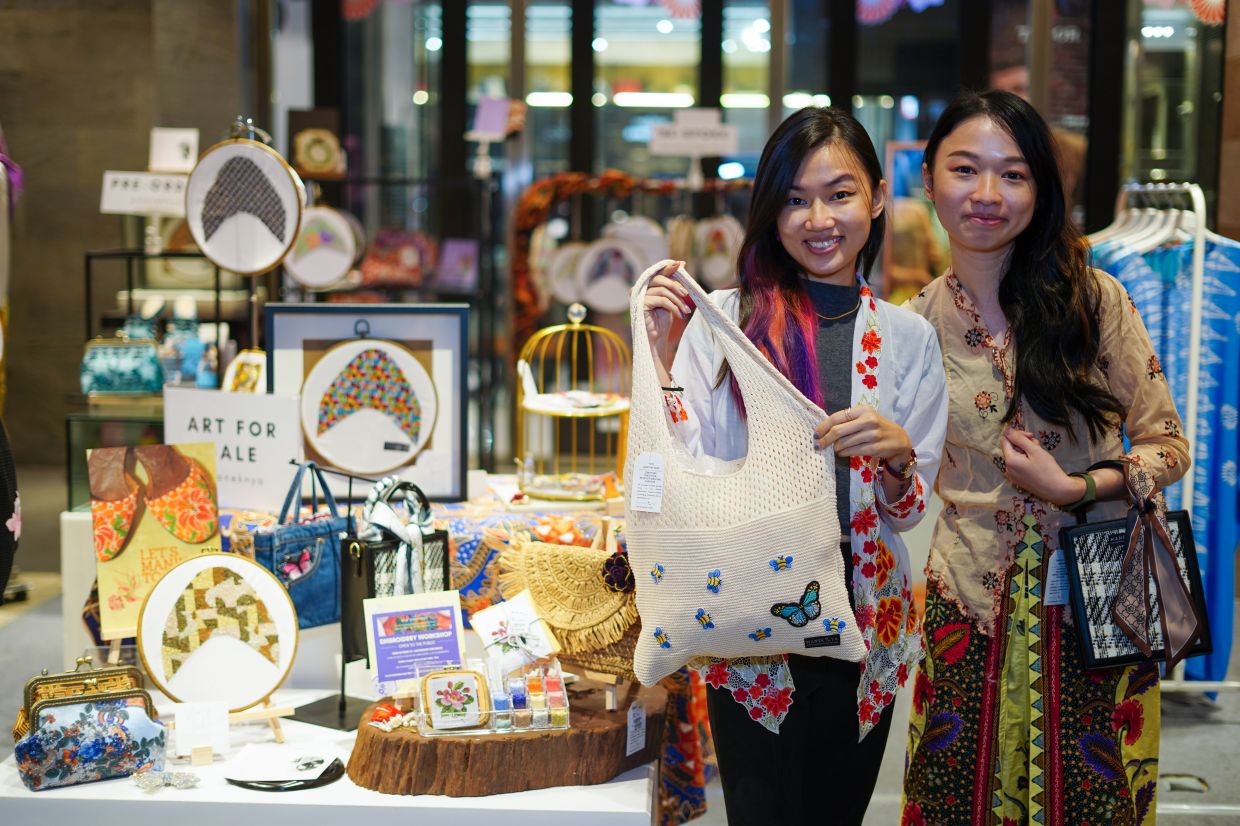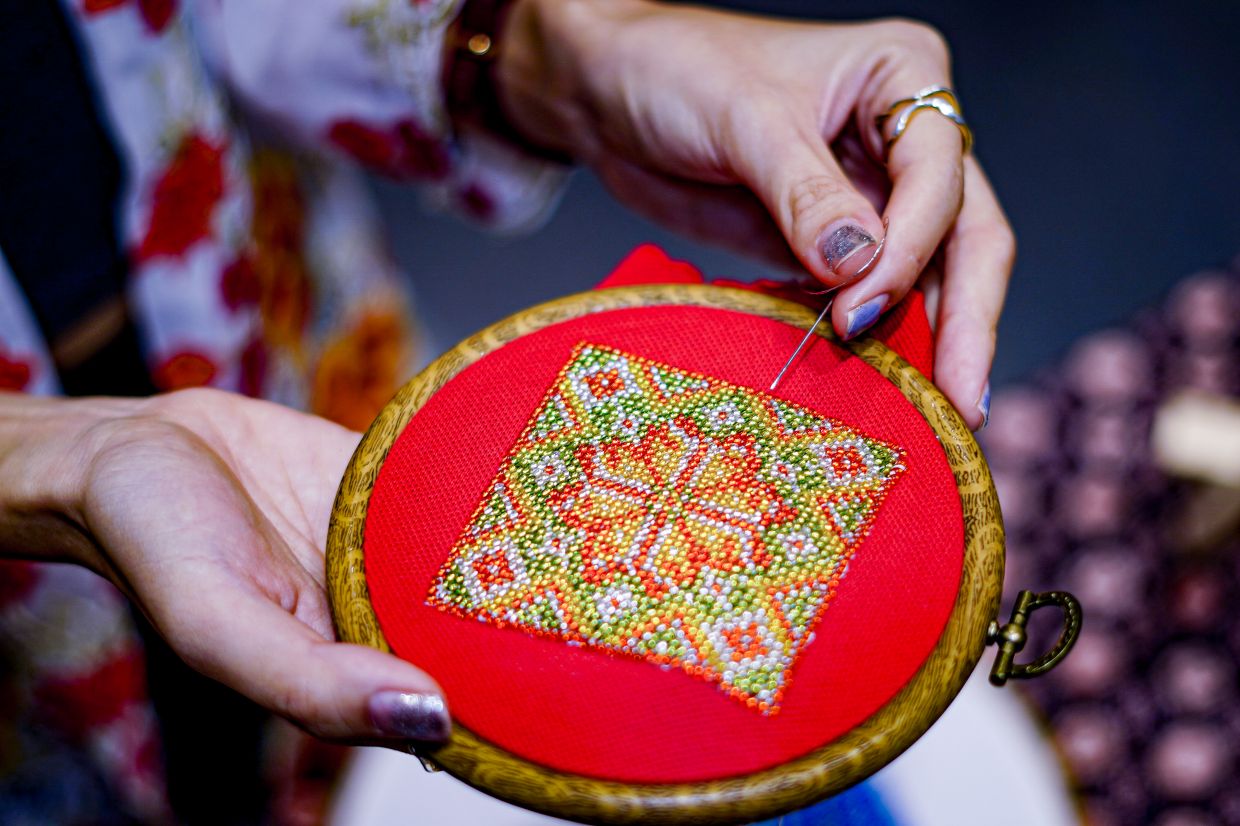If the beading technique is good, a shoe can last from generation to generation and become a family heirloom, says ManekNya's co-founder Swee Lin. — SAMUEL ONG/The Star
ACROSS a wooden work table, ManekNya co-founder Lee Swee Lin slides a handful of impossibly tiny, delicate-looking coloured beads for closer inspection. The pieces, no larger than 2mm, come in a range of sizes and shades; some rich and opaque, others lustrous and speckled with light.
“Not many people know that these are made of glass,” she notes. “Some worry about using an iron on them, but since all of the beads we use are glass, they won’t melt like plastic ones would.”
Durable as they are dainty, these beads are central to the work of the artisans behind ManekNya, a handcrafted embroidery brand inspired by Peranakan beading traditions. Here, anywhere from 300 to 10,000 beads are employed by embroiderers to form intricate mosaics stitched onto a vibrant assortment of shoes, bags, hats and lifestyle accessories.
Founded in 2022 by Swee Lin and her sister, Swee May, the business was built out of a desire to honour and preserve their family’s cultural inheritance as Peranakans from Melaka.
The ‘Nya’ in ManekNya, meaning ‘mother’ in the Baba language, pays tribute to their beloved grandmother and mother, and the legacy and values passed down from them. Meanwhile, ‘Manek’ references ‘beads’ in the Peranakan style of writing.
“Essentially, the name means ‘the mother’s beads’. For us, it’s about remembrance and reminding ourselves that this all comes from the previous generations.”
Cultural threads
At the start, the business focused largely on crafting beaded shoes, as the traditional kasut manek-beaded slippers were prized hallmarks of Nyonya attire.
“But shoes are very technical, as there are different sizes, preferences and arches. So we began exploring different products like iron-on patches, tote bags and caps,” shares Swee Lin.
While still upholding cultural beading traditions, the sisters found ways to incorporate the beads into fresh, contemporary designs and products. Outside of the customary motifs of flowers and birds, ManekNya’s collection includes more geometric and abstract style patterns, as well as playful illustrations.
In addition to its bespoke shoes service and retail items, the business also aims to promote the art of Peranakan beadwork through regular workshops that teach the techniques of the artisan craft.
“A number of the students that join are inclined towards the cultural heritage aspect of it, and some who are Peranakan themselves are curious about the craft side of their culture,” she reveals.
Weaving a new future
Swee Lin, who has a background in finance and social entrepreneurship, manages the business side of ManekNya, while Swee May takes on the creative facets of the business and the training of artisans. “Right now we have about 20 artisans who continuously produce these products,” Swee Lin says.
All of ManekNya’s artisans are from underrepresented groups, including refugees and B40 single mothers. Due to the precise and painstaking nature of the beaded works, a pair of shoes takes a skilled artisan about three days to a week to complete.
“The training lasts for eight weeks, and an average person has to go through around 200 hours to get to that skill level,” she says.
Some students have excelled to the point where they have been asked to be trainers themselves.
“It’s a positive and empowering thing to see someone from their own community become trainers and go on to teach others.”
Elaborating on plans for the future, she shares that ManekNya has set its sights on entering the art market with larger scale art pieces that showcase Nyonya beading works in exquisite detail.
“My aim when I started was to educate, and change the landscape and perception of Nyonya beading and embroidery,” she says.
In preserving the traditional art form through creative adaptation while maintaining the highest standards of craftsmanship, these beaded pieces can serve to connect people across time.
“They’re quite strong,” comments Swee Lin. “If the beading technique is good, a shoe can last from generation to generation and become a family heirloom.”
This article first appeared in Star Biz7 weekly edition.







